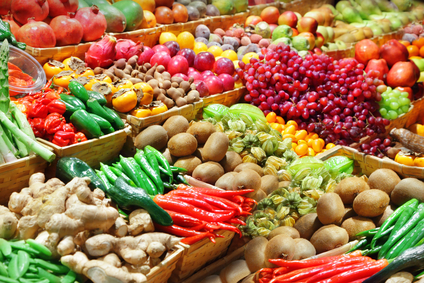GUYSIDE: Keep a weather eye out for dubious claims.

Take a hint from Pepe, and be skeptical of medical claims — the more grandiose the more skeptical!
I was watching my local newscast recently and heard about an innovative new treatment for “winter blues”, or Seasonal Affective Disorder. As someone who strongly dislikes 4 pm sunsets, I was interested enough to keep watching.
The treatment is a device called the Alpha LED Light Spa. This device, which resembles a tanning bed, offers a variety of programs that combine light, heat, and oxygen to treat a variety of symptoms. The owner of this particular device told the reporter that it was an effective treatment for more than 1000 disorders — and that REALLY got me interested. Here’s the list:
“Energizing Whole Body, Mind and Spirit, Cold/Flu, Sleep/Insomnia Improvements, Depression, Seasonal Affective Disorder, Mind Clarity, Meditation, Pain Relief, Lymphatic drainage, Wound Healing , Immune Boost, Stress Relief, Detoxification, Weight Loss, Cellulite Treatments, Skin Care – Acne Treatments, Skin Care – Anti-Aging, Addictions, Balances hormones, Migraine relief, Soothes nervous system, Lowers cholesterol, Infertility, Psoriasis, Anxiety, Inflammation, & more.”
Unfortunately, there’s no links to evidence on the site. And I haven’t been able to discover any in my time looking around. There is little doubt that SAD, disruptions in sleep due to circadian rhythms, and depression can be treated effectively by light therapy. But on the face of things, it seems unlikely that this device would be able to successfully treat more than 1000 problems.
Claims like this need to be taken skeptically, not least because at the Ottawa spa offering these treatments, it’s $75 per session.
And there’s no shortage of claims that need to be given the side-eye. Also this week, an article in the British Medical Journal looked at medical recommendations made on the Dr. Oz show and The Doctors. In the case of Dr. Oz, fewer than half of the medical recommendations provided had any sort of supporting evidence backing them up; 1 in 6 were actually contradicted by medical evidence.
It’s easy to make a medical claim, and ones that fit into what we want to hear (eat this and your belly will magically shrink!) are much more readily consumed by us humans than ones that are a little more work (eat less, move more, and stop with the Big Gulps).
You owe it to yourself to ensure the actions you take to preserve and improve your health are ones that have a basis in fact.
For those who’ve just finished celebrating Chanukah, and for those who are anticipating a visit from Santa, Merry Christmas and Happy Holidays!
(Photo is CC-licenced from Flickr user Yiie)
Read MoreFive a day for mental health and wellbeing
Have you been sensing a theme on Flashfree of late? I can’t help gravitating toward stories about mental wellbeing and reducing stress, namely because I have devoted the past few months toward regaining some semblance of balance after years of residing in the opposite flow. And so, once again, I do hope that you’ll allow me to indulge and share some pretty fascinating data:
Eating fruits and vegetables daily is associated with an increased odds of mental wellbeing in both men and women.
Mind you, researchers have not yet proven cause and effect. Yet, the data are pretty compelling! In fact, when British researchers evaluated certain influencing health-related factors in almost 14,000 British respondents participating in the Health Survey for England, they found that consuming (or not consuming) fruits and vegetables daily was the one health behavior that was most consistently associated with both high (and low) mental wellbeing in women and men.
Which other factors did they take into consideration?
Additional health-related behaviors that have been linked to mental health include body mass index, smoking habits and alcohol intake. In this case, Individuals who rated the lowest in terms of mental wellbeing tended to be obese, heavy or ex-smokers, never or ex-drinkers and reported eating the fewest daily servings of fruits and vegetables. Moreover, the the odds for having a lower overall mental wellbeing appeared to have increased exponentially with increasing smoking habits and decreasing fruits and vegetables intake.
Despite these factors, only intake of fruits and vegetables remained relevant and significant for both men and women; different BMI levels or alcohol intake had little bearing. What’s more? These findings tended to be more consistent for women than for men.
Let’s break down the numbers:
- Overall, 33.5% of individuals with high mental wellbeing ate five or more portions of fruits and vegetables daily
- 6.8% of people with the lowest mental wellbeing who reported eating less than one serving daily
- 31.4% with high wellbeing consumed three to four portions daily
- 28.4%of people who ate one to two servings a day had high mental wellbeing
It’s truly linear, isn’t it?
So, what is mental wellbeing?
Think all of everything. It’s more than the absence of mental illness or some sort of psychological issue. Indeed, its implications are huge: mental wellbeing comprises completeness, full-functioning, life satisfaction, optimism, hope, self-esteem, resilience, coping, spirituality and good relationships. Think of the implications should fruits and vegetables be identified as something that actually drives mental wellbeing rather than contributes to it. An easy, enjoyable fix? Five a day? I’d say!!
Read More
Guyside: Fall food thoughts that aren’t hard to swallow.

This may or may not resemble your humble columnist at a barbecue.
Fall is a wonderful season. If you live in a climate where heat and humidity dominate summer, you start to feel relief. Autumn colours make the world beautiful. And (at least for me), food begins to change along with the season.
I love to grill food, and in our household, we take advantage of warm summer days to cook and eat outside as much as we can. But as days get shorter and cooler, we start to move the cooking inside, and that changes the nature of the dishes that get prepared too.
It’s already known that men tend to eat less healthily than women. And It’s really easy for men (and by men I mean me) to enjoy the grilling season a little too much. Sausages, thick steaks, ribs, rich barbecue sauces and the like are great in moderation, but easy to overdo. Even some of the salads I associate with summer have rich dressings that might reduce the benefits of all those healthy veggies. And none of this even begins to address some of the junky food that we eat as the day goes on.
I try to take fall as a sign to revisit what I eat a little bit. I’m not going to go macrobiotic or vegan, but it’s never a bad thing to examine your food choices every so often. Here’s some of the things I do:
- I’m the main cook in our household, so I do a few simple things to make food both good and healthy when shorter days come. I shop from a list, and stock up on basics that I know will get used up over time without going bad. If I’m making a dish that requires some perishable ingredient, I find other dishes to make that will use up that ingredient. For example, I made a pork curry on the weekend that needed ginger root. So during the rest of this week, there’s also a chicken tikka recipe that used ginger root and tonight is pork chops marinated in ginger.
- I try and make some healthy substitutions of ingredients or techniques where I can. Rather than white rice, I’ll use brown rice, or even better, brown basmati rice. Rather than make French fries in a skillet, I do ‘em in the oven. I’ll also switch up sweet potatoes for plain old potatoes. And I try to make things like marinades, dressings, and the like from scratch rather than use store-bought ones. It’s usually cheaper and better.
- The biggest additions to the menu in the fall are soups and slow-cooker meals. Soups or slow-cooker dishes usually mean multiple days are covered, making for stress-free cooking days if my partner and i are busy, and scratch soups are pretty simple to make. Nutritious and delicious works for me.
My big weakness? Lunches. I work from home, so I get to make lunches rather than eat out every day, but my instincts are to have a canned soup (lots of sodium) or a sandwich (processed meat); not always the best choices. So perhaps this fall I’ll try to do better with my lunch choices.
Maybe it’s time for you to take a look at what you cook and eat.
Photo: CC-licenced from the US Marine Corps Archives on Flickr.
Read MoreNewsflash: For better health, accentuate the positive!
Inflammation. It’s our bodies’ revenge in response to daily habits and exposure to stressors. Left unchecked, an increase in inflammatory markers in the bloodstream significantly increases the risk for chronic diseases and death. Increasingly, researchers are pointing to psychological distress — factors like hostility and depression — as playing a key role in inflammation. Yet, there is a silver lining to this story: positivity. In fact, Penn State researchers are reporting that they have found evidence supporting an association between mental wellbeing (e.g. positive social relationships, purpose in life and positive emotions) and lower levels of inflammation throughout the body.
Until now, most of the research in this area have relied on measures that don’t necessarily fully reflect emotional and stress in daily life. But these daily stressors are important and appear to affect physical functioning in the short term and over time, accumulate to wreak havoc on our health. Research has also fallen short when it comes to the benefits of minor positive events — called uplifts — that occur during daily; examples include dining with a friend, sharing a good laugh or taking a leisurely walk.
Yet, new study findings show that experiencing daily positive events at work, at home, within your network and via interactions can lower the levels of inflammatory markers, namely interleukin-6 (IL-6) and C-reactive protein. In women, these daily uplifts appear to also affect the levels of fibrinogen, a blood protein that contributes to clotting. After the researchers took potential factors that might skew the results into account, such as race and income, only IL-6 continued to be significantly and beneficially affected by these daily positive events.
Let’s look at IL-6 for a minute. In certain contexts like exercise or in the face of infection, IL-6 actually has anti-inflammatory properties. Yet, when it comes to psychological stress, IL-6 becomes pro-inflammatory, which is why finding ways to counteract its Dr. Jekyll/Mr. Hyde actions is so important.
Back to positive, daily events. The type that had the most impact were interpersonal positive events, particularly in women. I’ve written previously on the importance of friendships and social support as we grow older and these data help to bolster the evidence supporting this.
What’s lacking here is definitive cause and effect. But an association has been demonstrated and it’s never bad to step back, take stock and accentuate the positive on a daily basis. Not only does that strategy work to help our mental state but it may also help our bodies ward off disease.
Read More
Guyside: Breaking good
 I’m a pretty lucky person. While my life isn’t perfect, I have many advantages, and I’m thankful for them. It’s easy to forget about that when you get focused on some problem or other.
I’m a pretty lucky person. While my life isn’t perfect, I have many advantages, and I’m thankful for them. It’s easy to forget about that when you get focused on some problem or other.
But sometimes good enough shouldn’t be, you know?
Think about Walter White, a/k/a “Heisenberg” of Breaking Bad. He was a guy who had a “good enough” life — wife, son, baby on the way, a steady job that is respected, if not well-paying… and then a diagnosis of terminal lung cancer shattered everything in his life and forced him down a radically different path.
I’d be perfectly happy if not one person ever got diagnosed with lung cancer. And, for that matter, if people stopped making and using crystal meth. But I think that we don’t have to “break bad” — why not “break good?”
I’ve been trying to change some of my routines recently. For example, since I work from home I do most of the dinner preparation for the household. It’s the sort of thing that can make a break from staring at the computer or talking on the phone. And, like most people, I have a repertoire of dishes that I know well enough to essentially make without a great deal of thought.
So to break that up, I’ve started to search out new recipes, new ideas. It’s fun to try (especially when they work out well), and it breaks me out of the cooking rut and both me and my partner out of the taste-rut. Example: it being summer, coleslaw is a natural side dish for things we cook on the BBQ. I was used to buying bagged coleslaw from the store, then dressing it with a commercial dressing. Somehow I realized that hey, coleslaw’s just a few shredded veggies. So I started making my own. Then I tried some dressing recipes. WAY better than before. (FYI: I’ve become quite fond of this dressing recipe, with a few variations. Try it.)
I’ve changed other things recently too. I love beer. But having that end-of-day beer or the beer with supper, or the finished-the-yard-work beer can become a little … routine. So for a few weeks now, I’ve haven’t been bringing beer into the house. Now, when I have beer — like I did yesterday during an end-of-day business meeting, or like I did when I was visiting family recently — it’s DELICIOUS. At some point, I’ll likely restock the fridge, whenever I get the desire to do so.
There are all sorts of little routines that we establish in our lives. Many of them are there for very good reasons. We get up and shave and shower because we like being clean. We brush our teeth because we want our breath fresh and we don’t like cavities. But changing habits can be good for you. It stimulates your brain. It can make you think about the reason behind the habit. And that’s never bad.
Look at the routines of your day — the way you interact with people in your life, what you eat, drink, how and when you exercise, your activities, your leisure, your work. Pick one to play with, to try to change.
A lot of meditation practices focus on mindfulness — on simply being aware of your circumstances. If you feel good, note it. If your knee is sore, note that. If you want another cup of coffee, be aware of the desire. Assessing the little routines, experimenting by breaking one of them for good, and seeing if it improves your daily life — that’s part of mindfulness too. And failing is part of changing habits too. If you don’t like a change, or you can’t stop biting your nails, or whatever — just note that. Don’t beat yourself up over it.
Try it, just for fun.
Read MoreGuyside: A few simple tasks — no crunches required
 If you (and I DO NOT recommend it) judged what male health was all about by looking at popular culture, I think it could be summed up in one word: abs. Walk past a magazine rack and it’s all abs, all the time. But there’s a lot more to it than that.
If you (and I DO NOT recommend it) judged what male health was all about by looking at popular culture, I think it could be summed up in one word: abs. Walk past a magazine rack and it’s all abs, all the time. But there’s a lot more to it than that.
When it comes to health, we men can be our own worst enemy. According to the US government’s Medline, men are more likely to smoke, to drink, to ignore symptoms, to put off health care visits, and to make risky health choices. So today, a few simple tasks to get you back on track if you’ve strayed.
#1: The next few times you’re at a pharmacy, use the automated blood pressure checker. If it’s high compared to the guidelines printed on the machine, DON’T ignore it. Follow up.
#2: Get a cholesterol check. This is especially important if you have a history of heart disease, but it’s a good idea for everyone.
#3: If you’re getting drunk regularly, slow down. Binge drinking isn’t good for anything and it’s pretty bad for your health.
#4: This is a tough one for a lot of guys. Colon Cancer. At its least invasive, you do one of those smear your poo on a stick and then on a test strip thing. Gross, but not too bad. The finger’s next. Sigmoidscopy and colonoscopy are the final frontiers, so to speak. I am a little squeamish about stuff related to the old intestinal system, but you know what? SUCK IT UP. It’s important.
#5: if you’re smoking? Stop. There’s nothing good for you there.
And the final tip: to borrow from the Homeland Security stuff, if you see something, say something. When I got diagnosed with bladder cancer, it was because I acted when I saw blood in my urine. If you see something abnormal related to your body, take action.
It’s easy to buy into the old lie that you’re invulnerable, that you haven’t changed since high school, even when you’re buckling your belt on a new hole and your hair is disappearing. And if it helps you in your job or your personal life to tell yourself that story, that’s fine. But when it comes to your health, holding to closely to the convenient delusion could be a life-threatening decision. Don’t do it.
Image: Creative-commons licenced from Flickr user Ed and Eddie.
Read More







